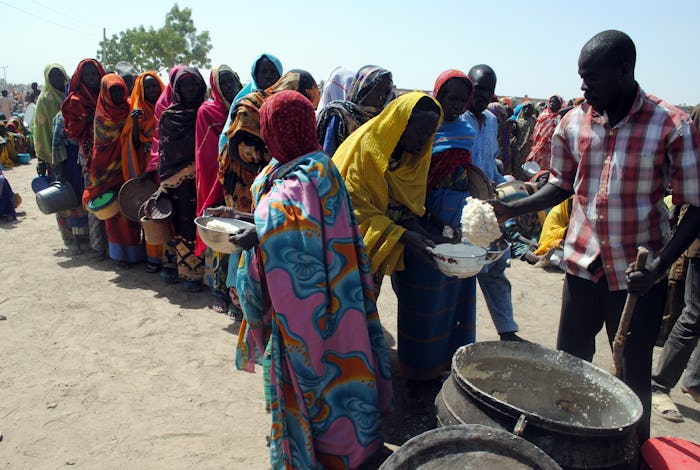News

How To Help The Nigerian Victims Of The Most Recent Terror Attacks
In the wake of a recent terrorist attacks throughout the world, increasing attention has been focused on places that the average Western news consumer might otherwise have forgotten. This weekend for example, weeks after yet another devastating attack, the hashtag #PrayForNigeria began been circulating on social media to draw attention to the long list of tragedies the West African nation has faced of late. Aside from participating in the viral trend, it's also important to know how to help the Nigerian victims in real life, beyond just posting a hashtag to your personal Twitter or Instagram. It might be a little more difficult, but in the end it will be more than worth it.
Ever since more than 200 girls were kidnapped by the terrorist group Boko Haram in 2014, there has been an outpouring of support for the victims in Nigeria. In recent months, a string of suicide bombings also ripped through the country. The most recent incident occurred on March 16, when two female suicide bombers killed 25 people at a mosque in Maiduguri, in the northeastern part of the country.
While it may seem like a place too far away to make a real difference, there are many groups operating in the region that allow outsiders to send monetary aid, so that local officials are able to bring in the supplies, food and water, or other services they know the victims need. According to The Washington Post, religious leaders and local Nigerian politicians operating with regional institutions and universities like the American University of Nigeria provide food to hundreds of thousands of displaced Nigerians. Muslim and Christian coalitions too provide food, such as rice and beans, to over 200,000 people, mainly women and children.
Of course, while a simple Google search will help you find dozens of ministries and organizations purportedly collecting donations and sponsorships, it's also worth inspecting those organizations a few times over before donating. Still concerned that your monetary donations might not be going to a legitimate effort? Western Union has thankfully offered up some advice when looking to donate to international charities.
Follow The Money
Before dropping a dime, look to see how the donated money is spent. You don't have to be a top notch investigator to dig into an organization's funding either: According to Western Union, websites like GuideStar and Charity Navigator offer access to many nonprofits’ financial data, which will help you decide which organization is planning to either give the most back to the victims, or which ones will be using your donation in ways from which local communities or camps actually benefit.
Check Histories
Go back a little bit and run a few extra searches on the charity you've chosen to find press about past successes. You should also see if other people who've donated have shared their experiences online or on social media. Word of mouth means a lot, for the same reasons stated above.
Red Flags Are Red Flags
There are dozens of incredible organizations operating in Nigeria right now, but every once in a while, as in any situation, scams or untrustworthy organizations can slip through the cracks as well. Charities are rated and ranked on websites like GiveWell, where you can see if the organization has run into any problems in the past or if others have had difficult (or even illegal) experiences with the nonprofit.
One more important note? "As far as possible, support should go not to U.S. contractors but to local providers, who are in place to offer immediate help," The Washington Post suggested in a column last year. "Such assistance could go a long way toward showing the United States’ commitment to Nigeria’s people and helping stave off further radicalization of those who feel abandoned by Nigeria’s government and the world."
If you can find a reputable, concrete way to send support — whether it's directly to victims or backing aid workers in the region — go for it. With a little due diligence, you can find ways to lend a hand.